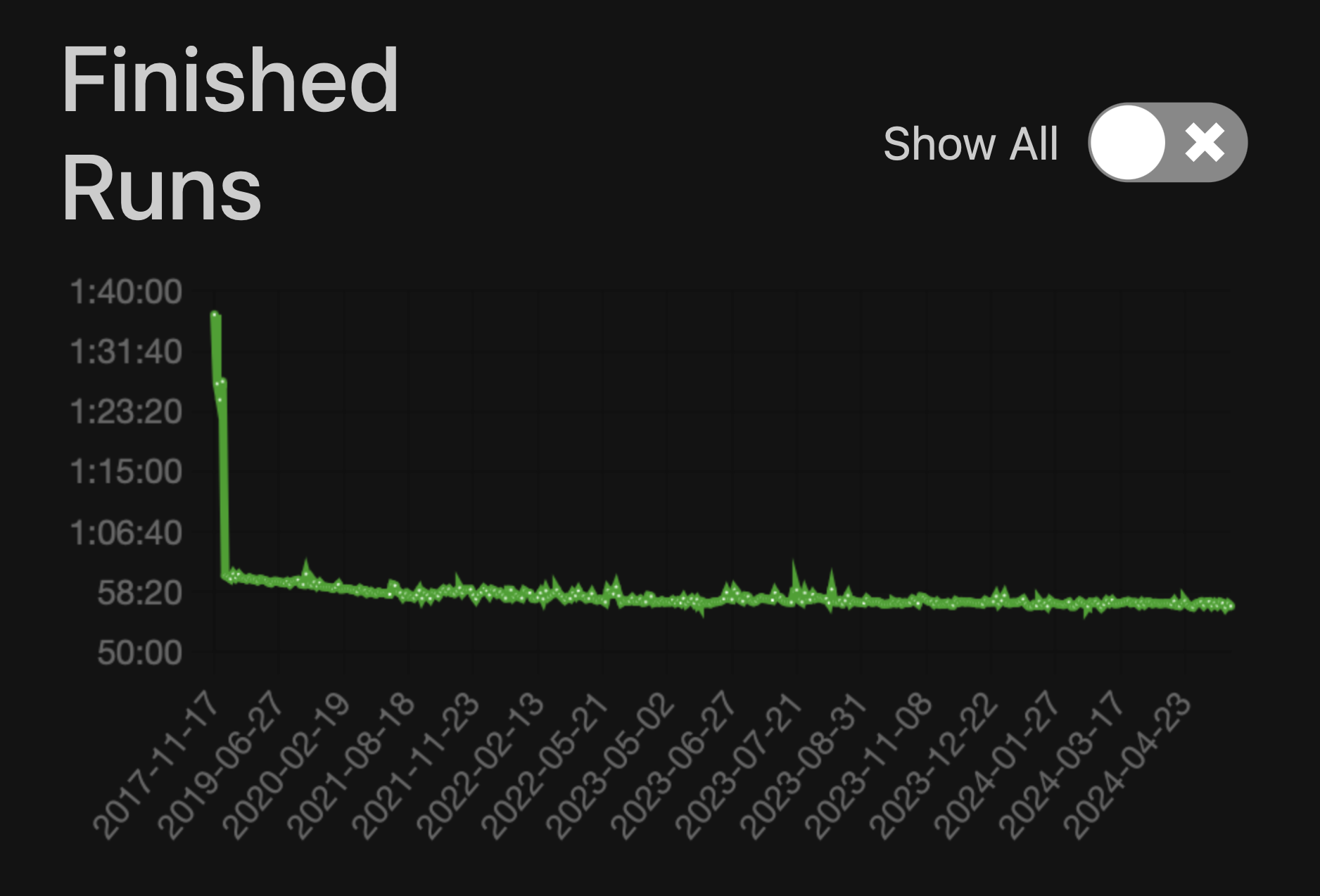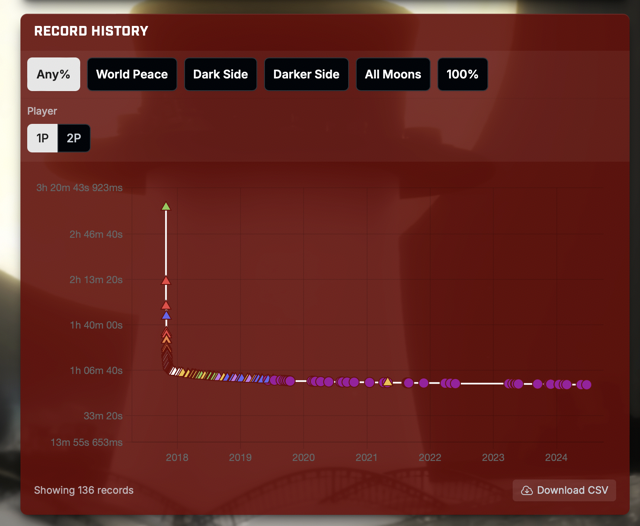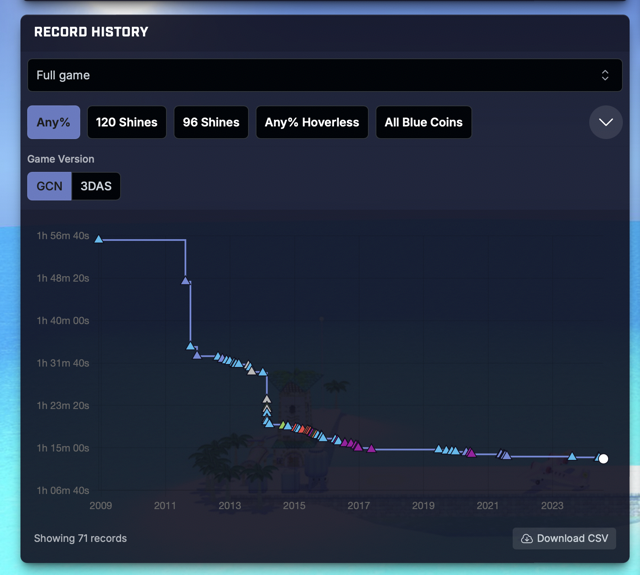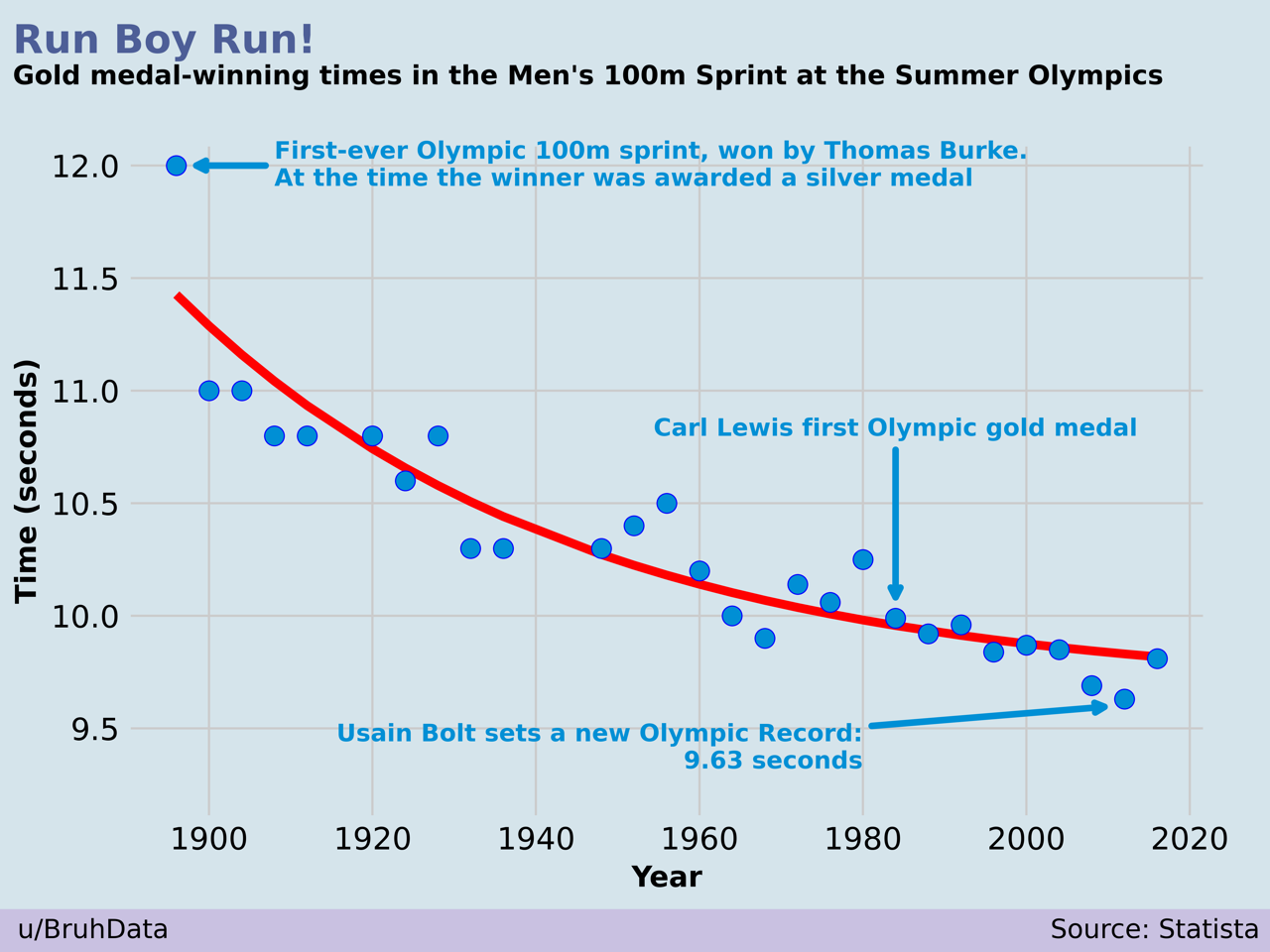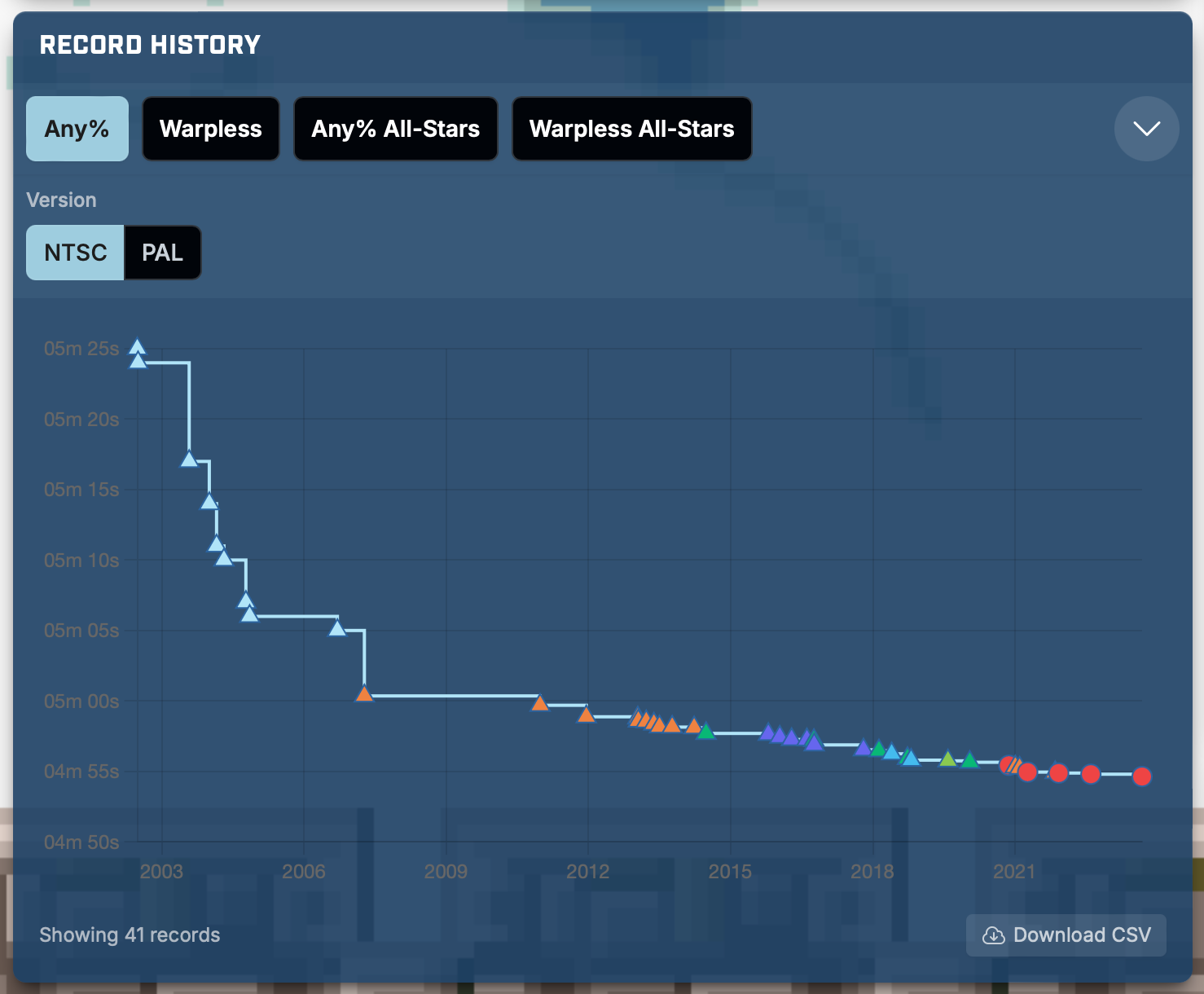So Many Silver Landmines
Silver bullets magically solve problems.
Silver landmines magically create problems.
On Silver Landmines
Silver landmines plague every imaginable landscape. There are myriad surefire ways to kill plants, to lose games, to make enemies, to guarantee failure, to tank quality, etc.
The beginner's best strategy is to avoid silver landmines. No winning moves -- novices compete to commit fewer fatal mistakes.
Mediocrity is that precise point when you can consistently avoid all the obvious landmines. After you internalize all that basic communal wisdom, you join all the others who've learned the same stuff. Somewhat by definition, middling folk make the unimpressive bulk of every bell curve.
Experts journey into territory where silver landmines are yet uncharted. As obvious errors tend toward zero, constructive feedback becomes more abstract, more personal, more inscrutable.
Above: tyron18's Any% PB history for Super Mario Odyssey.
This progression from beginner to expert is best demonstrated (and meticulously recorded) by speedrunners.
Most speedrunners' "personal best" times follow a hockey stick graph. Beginners first rapidly memorize a map of silver landmines via trial-and-error. Once that map becomes familiar, intermediate players burn that same knowledge into muscle memory. Becoming experts, those same players eke out performance via advanced statistics, deep introspection, reverse engineering, and whatever else it takes.
Some fun examples of weird expert strats: flipping controllers, dirtying discs, and frying consoles
Silver Bullets Become Silver Landmines
In folklore, a silver bullet is often one of the few weapons that are effective against a werewolf, vampire, witch, or other supernatural beings. The term "silver bullet" is also a metaphor for a simple, seemingly magical, solution to a difficult problem: for example, penicillin circa 1930 was a "silver bullet" that allowed doctors to treat and successfully cure many bacterial infections.
There is no silver bullet to make a healthy person live 10x longer. But penicillin consistently quintupled the lifespan of children in 1930. Now antibiotics are ubiquitous; penicillin is no longer considered a silver bullet.
Penicillin lost its "silver bullet" magic long before it lost effectiveness. All antibiotics were deus ex machina; now they're pedestrian. To deny modern antibiotic treatment for an infection is beyond folly -- it's a silver landmine.
To be clear, silver bullets totally exist until they become the norm. Case study: Vermeer mirrors are still relatively unknown tools for producing realistic art. If Vermeer mirrors consistently help artists produce great work, then such great work will become the new norm, and artifacts of Vermirrors will become signs of mediocrity.
But "simple" is not always "easy". For example, exercise enhances life in many dimensions for very little investment. Seriously, exercise is the single greatest lever humans have on their healthspan. Scientists haven't pinpointed the causal mechanisms yet -- it's still spooky magic. And so exercise remains a widely-accessible silver bullet because it [mostly] sucks.
World-record progressions follow familiar curves. The silver bullets of older generations eventually become silver landmines cemented in the public consciousness. All cutting edges become dull.
The bullet-to-landmine effect becomes most exaggerated when a new strategy/glitch/exploit is discovered. In the chart above, Samura1Man pioneered Gelato Skip in a run during February 2014. From that moment forward, all strategies that didn't confer equal or better results than the Gelato route were non-viable.
Throughout the decades, across every game, this process repeats itself in fractal detail; each silver bullet is permanently etched into the history books until it becomes another drab silver landmine beginners reckon with.
No More Silver Bullets
In 2001, Takeru Kobayashi doubled the world hot dog consumption record with the Solomon Method and soggy buns.
This world record will likely not double again in such dramatic fashion, but competitive eating is still in its infancy -- expect a slow 10% improvement over the next few decades.
I'd take a very long bet that no significant glitches/exploits remain in men's 100m dash. <9s is possible this millennium with improvements in medicine, training, athlete selection, etc. Meanwhile <8s might be possible with doping and genetic enhancements. <5s sounds ridiculous without stretching the definition of "human" and "shoes".
Likewise, we're nearing the end of major improvements to Super Mario Bros. Humans are currently only 0.12% away from the theoretical best times performed by computers.
No, More Silver Bullets
Brooks argues that "there is no single development, in either technology or management technique, which by itself promises even one order of magnitude [tenfold] improvement within a decade in productivity, in reliability, in simplicity." He also states that "we cannot expect ever to see two-fold gains every two years" in software development, as there is in hardware development (Moore's law).
Further reading: No Silver Bullet by Fred Brooks
When you turn the silver bullet analogy towards technology, predictions become unpredictable.
In almost every measurable dimension, computing hardware can still theoretically improve by a trillion percent. Moore's epoch may be ending, but computation clearly has many, many silver bullets left.
But that's hardware -- where are we in software's hockey stick? How much performance and reliability improvement remains in software development? What would software progression look like if the M1 MacBook Pro was the final computer put into production?
Humanity hasn't yet developed a solid unified theory of computation! The Church-Turing Thesis is at best a definition/observation. I'm in the early stages of fixing this; feel free to email me if you know any math folks who might be interested in working together.
I don't know how many silver bullets are left in software's magazine, but it's probably not zero:
- Some dude made 10,000x improvements to Microsoft's core programs
- A small team led by Alan Kay built a feature-rich OS in <15MB
- 35 devs built a company that sold for $19B
- These folks drive cars with smartphone-esque hardware
- RollerCoaster Tycoon was made by a lone dev in assembly
- A very small team of devs continuously pushed the limits of game dev for nearly a decade
- Nobody seems to know where software's silver landmines are buried
Many nascent software strategies smell like silver bullets: data-oriented design, better query languages (and databases), AI tooling, better spreadsheets, holistic OS/PL/VCS design, "robot managers", array language renaissance, continuous computing, lossy computing, etc.
I'm personally aiming to create a few silver bullets with scrapscript and scrapsheets, plus many other surprises in the magazine!
An unfathomable future -- another 100,000x jump in computing, where those improvements inevitably percolate into science, into manufacturing, into economic growth, into everything, into everything, into everything. Imagine how many hot dogs we'll be able to eat in a single sitting!
